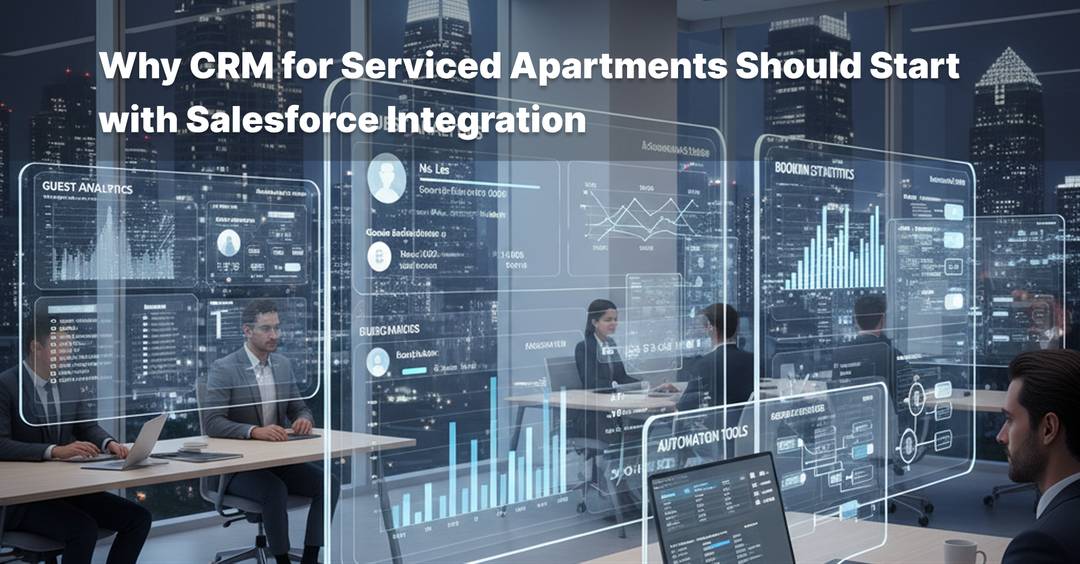Why CRM for Serviced Apartments Should Start with Salesforce Integration
Discover how Salesforce integration transforms serviced apartment management through advanced CRM, guest data insights, and integrated analytics.
Introduction
In today’s fast-moving hospitality landscape, serviced apartment operators need more than just a booking platform—they need a connected, data-driven system that enhances guest relationships, streamlines operations, and boosts revenue. A Salesforce property management integration achieves all of this by merging the power of a customer relationship management (CRM) platform with robust property management tools.
The Importance of CRM in Serviced Apartment Management
Customer relationship management is no longer limited to traditional sales pipelines. In serviced apartment operations, it’s the foundation for understanding guests, personalizing experiences, and improving lifetime value. A CRM for serviced apartments unifies all interactions—bookings, service requests, communications—into a single record. This creates a full picture of every guest and business partner, helping managers anticipate needs and drive loyalty.
When Salesforce is integrated into the property management system (PMS), it becomes the core engine that connects marketing, booking, billing, and analytics. This allows serviced apartment providers to deliver seamless guest journeys while keeping internal teams synchronized in real time.
How Salesforce Integration Works
Salesforce integration connects your PMS to Salesforce’s cloud-based CRM, allowing automatic data sharing between systems. Guest profiles, reservations, payments, and communications all flow into Salesforce, where they can be analyzed and used for performance tracking, automation, and guest engagement.
Native vs. API-based Integration
Some property management systems, such as Salesforce-based platforms, are built natively within the Salesforce ecosystem, ensuring deeper customization and scalability. Others connect through APIs to sync essential data fields. Both methods give operators unified access to key metrics—bookings, revenue, and guest sentiment—within a single dashboard.
Key Benefits of Salesforce Property Management Integration
- Centralized Guest Data for a 360° View: Every touchpoint—email, chat, booking, or feedback—is stored under one guest record, enabling personalized communication and improving retention.
- Streamlined Booking Management System: An integrated booking management system powered by Salesforce reduces double-bookings, automates confirmations, and improves collaboration between departments.
- Integrated Analytics for Performance Tracking: Dashboards show occupancy, ADR, RevPAR, and guest satisfaction metrics, helping operators identify trends and optimize pricing strategies.
- Guest Data Insights for Personalization: Segment guests by behavior and booking patterns to deliver targeted offers, loyalty rewards, and communications that boost repeat bookings.
- Automation That Saves Time and Enhances Service: Automated housekeeping schedules, maintenance tickets, and pre-arrival messages free staff for higher-value guest service.
Real-World Applications and Results
Serviced apartment brands using Salesforce-based PMS solutions report higher operational efficiency and stronger guest engagement. Automated workflows reduce check-in times, predictive analytics prevent cancellations, and pre-stay personalization increases upsells and satisfaction.
These improvements lead to better occupancy rates, stronger reviews, and greater brand loyalty—key drivers of long-term profitability.
Implementing Salesforce Integration: A Practical Guide
- Audit existing data sources: Identify guest, reservation, and billing databases.
- Define integration goals: Focus on CRM adoption, data unification, and automation.
- Select integration type: Choose native Salesforce PMS or API-based connector.
- Map key data objects: Include guests, reservations, invoices, and maintenance requests.
- Test workflows and train teams: Run pilots to ensure smooth adoption.
Tracking Success: KPIs to Watch
- Occupancy rate and revenue per available unit (RevPAR)
- Average daily rate (ADR) and channel performance
- Guest satisfaction and repeat booking rate
- Time saved from automation and process efficiency gains
Common Integration Challenges and How to Avoid Them
While Salesforce integration delivers major advantages, managing data quality and scope is critical. Maintain data hygiene by removing duplicates, aligning property codes, and defining permission roles. Start small, automate gradually, and scale confidently.
Conclusion
Salesforce integration is more than a tech upgrade—it’s a strategy for transforming serviced apartment operations. By connecting CRM, booking, and analytics, operators achieve better visibility, automation, and guest satisfaction.
Embrace the future of hospitality with Salesforce-powered property management from Booking Ninjas.







_-_A_Complete_Guide.png)










.png)
+for+Hotel+Chains.png)
